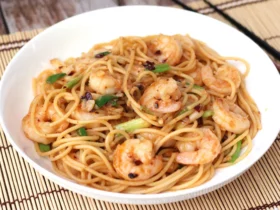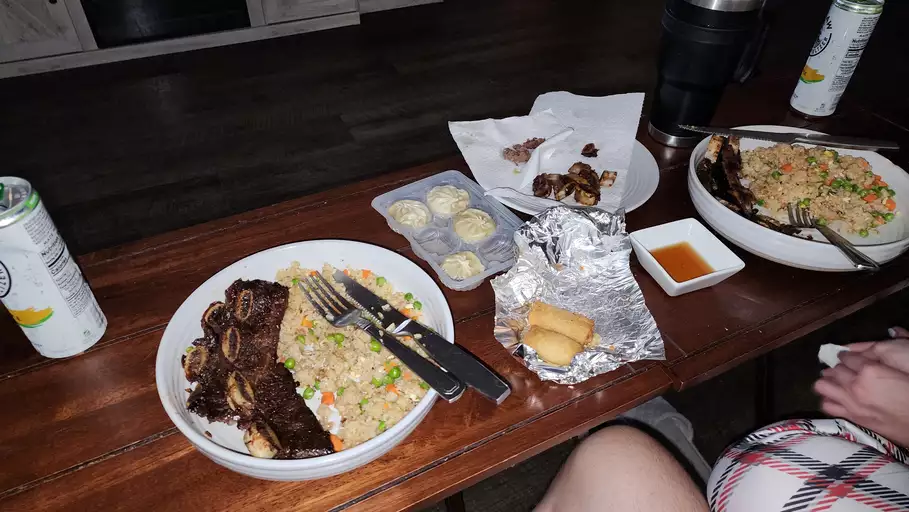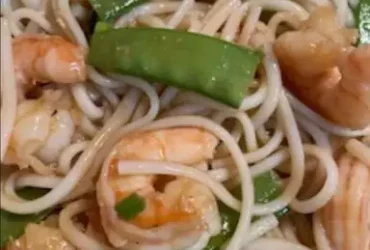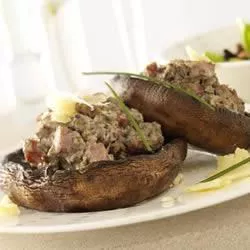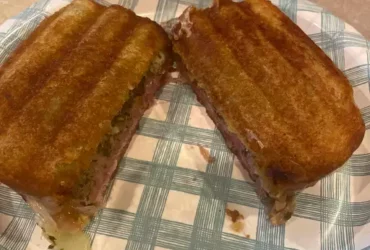Ingredients
For the marinade
The ingredients for Kalbi, Korean BBQ short ribs recipe, are as follows:
Marinade Ingredients
For the marinade:
- Soy sauce: This is a key ingredient in the marinade, providing depth and umami flavor to the dish. Use a high-quality soy sauce for the best results.
- Rice vinegar: This adds a sour and slightly sweet note to the marinade. It helps to balance out the savory flavors from the soy sauce.
- Sugar: A small amount of sugar is added to the marinade to provide sweetness and help balance out the savory flavors.
- Ginger: Grated ginger adds a spicy and warming flavor to the marinade. You can use either fresh or dried ginger for this recipe.
- Garlic: Minced garlic is added to the marinade for its pungent flavor and aroma. Use 2-3 cloves of garlic, depending on your taste preferences.
- Black pepper: A small amount of black pepper is added to the marinade to add depth and warmth to the dish.
Main Ingredients
The main ingredients for Kalbi are:
- Short ribs: Also known as Korean-style BBQ short ribs, these are meaty ribs that are cut into bite-sized pieces. You can use either beef or pork for this recipe.
- Olive oil: This is used to brush the short ribs with before grilling and during cooking.
- Green onions: Thinly sliced green onions are used as a garnish for the dish, adding a fresh flavor and texture.
Additional Ingredients
You will also need:
- Potato starch or cornstarch: This is used to dust the short ribs with before grilling, helping to create a crispy exterior.
- Honey (optional): A small amount of honey can be added to the marinade for its sweetness and ability to balance out the savory flavors.
Main Korean chili paste (gochujang)
Gochujang is a staple ingredient in Korean cuisine, and it plays a crucial role in enhancing the flavor of Kalbi, a popular Korean BBQ dish made with short ribs. The main component of gochujang is chili peppers, specifically Korean red chili peppers known as “gochu.” These peppers are fermented along with rice powder, water, and salt to create a thick, sticky paste.
The fermentation process can take anywhere from several months to over a year, which contributes to the development of gochujang’s characteristic flavor and texture. The resulting paste is sweet, savory, spicy, and slightly smoky, making it an essential component in many Korean dishes, including Kalbi.
When using gochujang in cooking, it’s often mixed with other ingredients such as soy sauce, garlic, ginger, brown sugar, and sesame oil to create a marinade for the short ribs. The gochujang adds depth and heat to the dish, while also helping to balance out the flavors.
In traditional Korean cuisine, gochujang is often used as an ingredient in sauces, stir-fries, and braising liquids. It’s also used as a seasoning in soups, stews, and salads. In the case of Kalbi, the gochujang marinade helps to tenderize the short ribs while infusing them with its distinctive flavor.
Some common characteristics of high-quality gochujang include its rich, reddish-brown color and thick, sticky texture. The paste should be free of lumps and have a smooth consistency. When using gochujang in cooking, it’s essential to mix it well with other ingredients to avoid any lumps or uneven flavor distribution.
Overall, gochujang is an integral component of Korean cuisine, and its unique flavor profile makes it a versatile ingredient for many dishes, including Kalbi. By incorporating high-quality gochujang into your cooking, you can add depth, heat, and complexity to your recipes, making them more authentic and delicious.
Sesame oil
Kalbi, a popular Korean dish that consists of marinated short ribs, typically involves the use of various ingredients to achieve its signature flavors and textures.
One key ingredient in Kalbi recipes is Sesame oil, which plays a vital role in adding depth and aroma to the dish. Sesame oil is extracted from sesame seeds through a process that involves crushing, pressing, or solvent extraction.
The distinctive nutty flavor of Sesame oil comes from the presence of sesamin and sesamolin, two compounds found in sesame seeds.
Sesame oil has a high smoke point, making it an ideal choice for cooking at high temperatures. It is often used in combination with other oils like soy sauce to create the marinade for Kalbi short ribs.
Characteristics of Sesame Oil
- Smoky flavor: Sesame oil has a distinct smokiness that comes from the roasting process involved in its production.
- High smoke point: This makes it suitable for high-heat cooking and adds to the crispy texture of Kalbi short ribs.
- Nutty aroma: The nuttiness is a result of the compounds sesamin and sesamolin, which give Sesame oil its unique character.
Using Sesame Oil in Kalbi Recipes
Sesame oil can be used at different stages of cooking to enhance the flavor and aroma of the dish. Here are some ways to incorporate it into your Kalbi recipe:
- Add a small amount of Sesame oil to the marinade mixture for Kalbi short ribs.
- Use Sesame oil as a finishing oil by brushing it on the short ribs during the last few minutes of cooking.
Tips for Selecting and Storing Sesame Oil
Sesame oil can be found in most Asian grocery stores or online. When selecting Sesame oil, look for products with a dark color and a rich aroma. Avoid oils that have a light color or an unpleasant smell.
Store Sesame oil in the refrigerator to prevent it from oxidizing and losing its flavor and aroma. It’s also essential to keep Sesame oil away from heat sources and direct sunlight, as this can cause it to become rancid.
Safety Precautions
Sesame oil is generally considered safe for consumption in small quantities. However, consuming large amounts of Sesame oil may lead to adverse health effects, such as allergic reactions or digestive issues.
Pregnant women and individuals with sensitive stomachs should use Sesame oil with caution and consult their healthcare provider before consuming it in large amounts.
Conclusion
Sesame oil is a vital ingredient in Kalbi recipes, providing its signature flavor and aroma. When selecting and storing Sesame oil, consider its characteristics, uses, tips for selection, and safety precautions to ensure that your dish turns out flavorful and authentic.
Garlic, minced
The key to achieving depth and umami flavor in the Kalbi Korean BBQ Short Ribs recipe lies in the selection and preparation of its ingredients, particularly with regards to garlic.
Garlic plays a crucial role in adding an aromatic depth and warmth to the dish, making it essential for any Korean BBQ enthusiast or culinary connoisseur attempting this recipe.
When working with garlic in cooking, the method of preparation is just as important as the ingredient itself. In the case of this Kalbi recipe, minced garlic takes center stage.
Mince Garlic Properly
The first step to achieving perfectly prepared garlic for your Korean BBQ Short Ribs is to choose the right type of garlic. Opt for fresh, plump cloves with a firm texture, free from any signs of sprouting or mold.
Peel each clove by pinching the root end and gently pulling downwards to release the papery skin. This will help prevent any bitter flavors that can come from raw garlic.
To mince the garlic, use a chef’s knife or a microplane grater. Place a peeled clove on its side and slice off one of the larger pieces at an angle to create small, thin pieces of garlic.
Repeat this process for each clove until you have a sufficient amount for your recipe.
Once your garlic is minced, it’s essential to sauté or cook it properly to eliminate its raw flavor and prevent any overpowering pungency in the dish. This can be achieved through various cooking methods, such as stir-frying with oil, grilling, or even using a skillet.
The Importance of Garlic Quantity
When adding garlic to your Kalbi recipe, remember that less is often more. Overuse of garlic can lead to an overpowering flavor and aroma in the dish, overwhelming the delicate taste of the short ribs.
A general guideline for minced garlic when preparing Korean BBQ Short Ribs would be about one clove per two servings. However, feel free to adjust to your personal taste preferences.
Remember that garlic not only adds depth and umami flavor but also carries the cultural significance of many traditional cuisines, including Korean barbecue.
Ginger, grated
The success of any Korean BBQ dish relies heavily on the quality and preparation of its ingredients, with ginger being a crucial component that adds depth and warmth to the flavors.
When it comes to using ginger in cooking, particularly in grated form, it’s essential to understand its properties and how it affects the overall taste and texture of the dish. Grated ginger is typically made by peeling the skin off a fresh ginger root and then grating it using a fine grater or food processor.
The resulting mixture should have a fine, even consistency that can be easily mixed with other ingredients without any lumps or texture issues. This grated form of ginger allows it to cook evenly and quickly, releasing its natural oils and flavors into the surrounding ingredients.
In the context of Kalbi, Korean BBQ short ribs, grated ginger is often combined with soy sauce, brown sugar, garlic, and sesame oil to create a marinade that tenderizes the meat and infuses it with a rich, savory flavor. The grated ginger adds a spicy, slightly sweet note that complements the other ingredients perfectly.
When selecting ginger for grating, look for roots that are firm, smooth, and free of any bruises or soft spots. Freshness is also crucial, as older ginger tends to be drier and less flavorful. It’s best to purchase fresh ginger from an Asian market or a high-end grocery store to ensure you get the best quality.
To grate ginger effectively, start by peeling it using a vegetable peeler or a sharp knife. Then, hold the peeled ginger firmly in place with one hand and use a fine grater or food processor to grate it into a fine consistency. Be careful not to press too hard, as this can cause the ginger to become pulpy or crushed.
Once you have grated your ginger, you can store it in an airtight container in the refrigerator for up to a week or freeze it for longer storage. Grated ginger is a versatile ingredient that can be used in a variety of recipes beyond Kalbi, from stir-fries and soups to baked goods and desserts.
Its unique flavor profile makes it a staple in many Asian cuisines, particularly in Korean, Chinese, and Japanese cooking. Whether you’re using it as a marinade base or adding it to sauces and dressings, grated ginger is sure to elevate your dishes to the next level.
By understanding how to prepare and use grated ginger effectively, you can unlock new flavors and possibilities in your cooking and take your Korean BBQ dishes to the next level.
Brown sugar
Brown sugar is a key ingredient in many recipes, including the popular Kalbi Korean BBQ short ribs.
In the context of this dish, brown sugar serves multiple purposes – it adds depth and sweetness to the marinade, helps balance out the savory flavors of the soy sauce and garlic, and contributes to the development of a rich, caramelized crust on the short ribs during grilling.
Brown sugar is made by refining white sugar and then heating it until some of the sugars are caramelized. This process gives brown sugar its distinctive flavor and aroma.
There are several types of brown sugar available in the market, including Light Brown Sugar, which has a lighter color and milder flavor, and Dark Brown Sugar, which is richer and more robust.
When using brown sugar in recipes like Kalbi, it’s often combined with other ingredients such as soy sauce, garlic, ginger, and sesame oil to create a marinade that adds flavor and tenderness to the short ribs.
The amount of brown sugar used can vary depending on personal taste preferences. However, a general rule of thumb is to use about 1-2 tablespoons of brown sugar per pound of short ribs for an intense flavor or 2-3 tablespoons for a milder flavor.
In the case of Kalbi, the brown sugar helps balance out the bold flavors of the Korean chili flakes and soy sauce, creating a harmonious and balanced taste experience that is both savory and sweet.
Overall, brown sugar plays a vital role in the Kalbi recipe, adding depth and complexity to the dish while balancing out its bold flavors.
Black pepper
The dish Kalbi, a classic Korean barbecue short ribs recipe, relies heavily on the incorporation of several key ingredients to achieve its unique flavor profile and texture. One essential component is black pepper, which plays a significant role in enhancing the overall taste experience.
The use of black pepper in Kalbi serves multiple purposes. Firstly, it adds an aromatic quality to the dish by releasing its distinctive pungency when cooked, thereby complementing the other ingredients and heightening their flavors.
Additionally, black pepper contains compounds that aid in digestion, making it a beneficial addition to the meal. Its inclusion is particularly noteworthy in the context of Kalbi, as the slow-cooking process involved can make the dish slightly heavy on the stomach due to its richness.
The versatility of black pepper allows it to be used both as an initial seasoning and a finishing touch. When added at the beginning of cooking, it helps to bring out the natural flavors of the other ingredients. Meanwhile, when applied as a finishing spice towards the end of preparation, it adds a subtle yet pronounced note that rounds off the dish nicely.
It is worth noting that in traditional Korean cuisine, black pepper is often used judiciously and in combination with other seasonings to achieve the desired flavor balance. In the case of Kalbi, the incorporation of black pepper alongside soy sauce, garlic, ginger, and sugar creates a harmonious blend that enhances the overall taste experience.
Given its significance in this recipe, it is not surprising that the quality of black pepper can greatly impact the final result. Opting for high-quality, freshly ground black pepper will yield better results than using low-grade or pre-ground alternatives. By making this simple adjustment, cooks can elevate their Kalbi and experience a more satisfying, aromatic flavor profile.
Making the Kalbi
Preparation
To make delicious Kalbi, also known as Korean BBQ short ribs, you will need to start by preparing the ingredients. This recipe serves 4-6 people and can be adjusted based on your needs.
Here are the ingredients you’ll need:
- 2 pounds beef short ribs
- 1/2 cup Korean chili flakes (gochugaru)
- 2 tablespoons brown sugar
- 2 cloves garlic, minced
- 1 tablespoon grated fresh ginger
- 2 tablespoons soy sauce
- 2 tablespoons rice vinegar
- 2 tablespoons sesame oil
- Salt and black pepper, to taste
- 1 tablespoon toasted sesame seeds (optional)
For the marinade:
- In a small bowl, combine chili flakes, brown sugar, garlic, ginger, soy sauce, rice vinegar, and sesame oil.
To prepare the short ribs:
- Cut the beef short ribs into 1-inch thick slices.
- In a large bowl or zip-top plastic bag, combine the sliced short ribs and marinade. Toss to coat evenly, making sure each piece of meat is well coated with the marinade.
Refrigerate for at least 2 hours or overnight (8-12 hours).
When you’re ready to grill:
- Preheat a grill or grill pan to medium-high heat. You can also use a charcoal grill, but adjust the temperature accordingly.
- Remove the short ribs from the marinade and shake off any excess.
- Grill the short ribs for 5-7 minutes per side, or until they’re nicely charred and cooked through. You may need to cook them in batches depending on your grill size.
To serve:
- Transfer the grilled Kalbi to a serving platter or individual plates.
- Sprinkle with toasted sesame seeds, if using.
- Garnish with green onions and serve immediately.
Enjoy your delicious Korean BBQ short ribs (Kalbi)!
Cut Korean short ribs (or beef short ribs) into 1/4inch thick strips.
To make Kalbi, also known as Korean-style short ribs, you’ll need to start by cutting beef short ribs into 1/4-inch thick strips. This process is crucial in achieving the signature tender and flavorful texture of Kalbi.
The first step is to select a high-quality piece of beef short ribs. Look for ribs that are rich in marbling, as this will contribute to the overall flavor and tenderness of the dish.
Once you have your short ribs, lay them flat on a cutting board and place them under refrigeration for at least 30 minutes to firm up before cutting. This will make it easier to achieve precise cuts.
To cut the short ribs into thin strips, hold a sharp knife at a 45-degree angle and carefully slice through the meat in one smooth motion. It’s essential to maintain a steady hand and apply gentle pressure to avoid applying too much tension on the meat.
The ideal cutting technique is to start from the top of each rib and cut down towards the end, making sure to keep the blade parallel to the surface. This will help you achieve evenly sized strips that are 1/4 inch thick.
As you cut through each strip, try to maintain a consistent thickness throughout. You can also use a sharp knife with a long, thin blade, such as a santoku or deba, which is specifically designed for cutting through meat with ease.
Continue cutting all the short ribs into 1/4-inch thick strips, and then place them in a large bowl or container. You can proceed to marinate the Kalbi strips according to your desired recipe, but it’s essential to achieve these precise cuts for an authentic Korean BBQ experience.
In a large bowl, whisk together all the marinade ingredients. Add the short ribs and toss to coat.
To make the delicious Kalbi, also known as Korean BBQ short ribs, you will need to follow these steps:
Step 1: Prepare the Marinade
In a large bowl, whisk together all the marinade ingredients, including soy sauce, brown sugar, garlic, ginger, black pepper, and sesame oil. This mixture should be smooth and well-combined.
Step 2: Marinate the Short Ribs
Add the short ribs to the marinade and toss to coat evenly. Make sure that each rib is fully submerged in the marinade and that they are coated with a generous amount of the mixture.
Marinade Ingredients
- Soy sauce: 1/2 cup
- Brown sugar: 2 tablespoons
- Garlic, minced: 4 cloves
- Ginger, grated: 2 inches
- Black pepper: 1 teaspoon
- Sesame oil: 2 tablespoons
- Green onions, thinly sliced: 1/4 cup (optional)
Step 3: Grill the Short Ribs
Preheat a grill or grill pan to medium-high heat. Remove the short ribs from the marinade and cook for 5-7 minutes per side, or until they are cooked through and caramelized.
Step 4: Serve and Enjoy
Once the short ribs are cooked, remove them from the grill and let them rest for a few minutes. Slice the meat into thin strips and serve with additional marinade sauce, if desired. Garnish with green onions and sesame seeds, if desired.
Serving Suggestions
- Serve with steamed rice or noodles
- Offer additional marinade sauce for dipping
- Garnish with green onions, sesame seeds, and toasted garlic
Cooking the Kalbi
Grilling
Kalbi, also known as Korean BBQ short ribs, is a popular and flavorful dish that originated in Korea. It’s made by marinating thinly sliced beef short ribs in a sweet and spicy sauce, then grilling them to perfection.
Here’s a step-by-step guide on how to cook Kalbi using a grill:
Ingredients:
- 1 pound beef short ribs
- 2 tablespoons Gochujang (Korean chili paste)
- 2 tablespoons soy sauce
- 2 tablespoons brown sugar
- 2 cloves garlic, minced
- 1 tablespoon grated fresh ginger
- Sesame oil and sesame seeds for garnish (optional)
Instructions:
- Cut the beef short ribs into thin strips against the grain. This will make them easier to grill and more tender in texture.
- In a large bowl, whisk together Gochujang, soy sauce, brown sugar, garlic, and ginger until well combined.
- Add the sliced beef short ribs to the marinade and mix until they’re evenly coated. Cover the bowl with plastic wrap and refrigerate for at least 2 hours or overnight.
- Preheat your grill to medium-high heat (around 400°F). Remove the beef from the marinade and shake off any excess.
- Grill the beef short ribs for 3-4 minutes per side, or until they’re cooked through and slightly charred. Repeat with the remaining strips of beef.
- Garnish with sesame oil and sesame seeds, if desired. Serve immediately and enjoy!
Tips and Variations:
- For a more intense flavor, increase the amount of Gochujang in the marinade or add some Korean chili flakes (gochugaru) for extra heat.
- Try using other types of protein like pork or chicken for a different twist on Kalbi.
Preheat grill to medium high heat. Remove the short ribs from the marinade, allowing any excess to drip off.
Cooking the Kalbi requires attention to detail and a gentle touch, especially when handling the delicate short ribs. Preheating the grill to medium-high heat is crucial as it ensures that the meat cooks evenly and at a steady pace.
Once the grill is preheated, remove the short ribs from the marinade, taking care to allow any excess to drip off. This step is vital in preventing flare-ups on the grill, which can burn the delicate meat and affect its texture.
Begin by placing a few of the marinated short ribs onto the grill, allowing them to cook for about 3-4 minutes per side. You may want to rotate the ribs slightly after flipping them to achieve even cooking and prevent burning.
As you cook each line of ribs, move them to a separate plate or tray once they’re cooked through. This will prevent overcrowding on the grill, which can lead to undercooked meat in certain areas.
Meanwhile, prepare the remaining marinade ingredients by mixing together soy sauce, brown sugar, garlic, ginger, sesame oil, and black pepper in a small bowl. This sweet and savory mixture will add depth and flavor to the Kalbi once it’s brushed onto the short ribs during grilling.
Once all the short ribs have been cooked, brush them with the prepared marinade ingredients during the last minute of cooking. This step is crucial as it adds a layer of flavor and helps caramelize the sugars in the marinade, creating a rich and sticky glaze on the surface of each rib.
To serve, place a few of the grilled short ribs onto a plate or platter, garnishing with sliced green onions, toasted sesame seeds, and a sprinkle of toasted garlic powder. The combination of flavors and textures in the Kalbi makes for an unforgettable culinary experience that is sure to impress even the most discerning palates.
Grill for 34 minutes per side, or until caramelized and slightly charred.
Kalbi, also known as Korean BBQ short ribs, is a popular dish that has gained worldwide recognition for its rich flavors and tender texture. To cook kalbi to perfection, it’s essential to follow a step-by-step guide that ensures the meat is cooked evenly and develops a nice caramelized crust.
Here’s a detailed recipe on how to grill kalbi:
Grilling Kalbi
Preferring the Meat
Before grilling, it’s crucial to prepare the meat properly. Make sure to clean and pat dry the short ribs with paper towels to remove excess moisture.
Mixing the Marinade
In a large bowl, whisk together 1/2 cup of soy sauce, 1/4 cup of sugar, 2 cloves of minced garlic, 1 tablespoon of grated ginger, and 2 tablespoons of sesame oil. Add the short ribs to the marinade and mix well to coat the meat evenly.
Grilling the Kalbi
Preheat your grill to medium-high heat (around 400°F). Remove the short ribs from the marinade, letting any excess liquid drip off. Place the kalbi on the grill and cook for 34 minutes per side, or until caramelized and slightly charred.
Tips and Variations:
- To ensure even grilling, rotate the short ribs 90 degrees after 17-20 minutes of cooking on each side. This will help develop a nice crosshatch pattern and prevent hotspots.
- For an added layer of flavor, brush the kalbi with a mixture of soy sauce, brown sugar, and rice vinegar during the last few minutes of grilling.
- Don’t overcrowd the grill – cook the short ribs in batches if necessary. This will allow for even cooking and prevent steaming instead of grilling.
Slicing and Serving:
Slicing the Kalbi
Once cooked, remove the short ribs from the grill and let them rest for a few minutes. Slice the meat into thin strips against the grain.
Serving Suggestions
Serve the kalbi with steamed rice, kimchi, or a simple green salad to balance out the richness of the dish. You can also serve it as part of a larger Korean BBQ spread with other grilled meats and vegetables.
- Best Dun & Bradstreet (DNB) Alternatives for 2025 - April 24, 2025
- Best Seamless.ai Alternatives for 2025 - April 22, 2025
- Best Coldlytics Alternatives for 2025 - April 22, 2025


